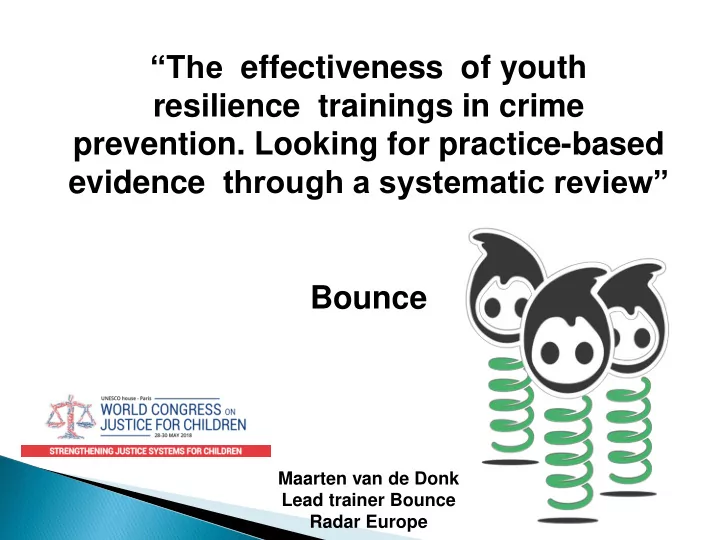

“The effectiveness of youth resilience trainings in crime prevention. Looking for practice-based evidence through a systematic review” Bounce Maarten van de Donk Lead trainer Bounce Radar Europe
BOUNCE Resilience Training, Network and Evaluation – STRESAVIORA II Co-funded by the Internal Security Fund of the European Union
Follow-up project of STRESAVIORA ( Strengthening Resilience against Violent Radicalisation – 2013-2015). Development of 3 interconnected and complementary tools aimed at the early prevention of violent radicalisation : BOUNCE Young BOUNCE Along BOUNCE Up
Resilience training program for youngsters (age 12-18) Psychophysical trainings aimed at strengthening resilience against radical influences Ten (inter)active group trainings Combination of action and reflection linked with personal experience Broad setting: youth, education, welfare, leisure Combination with BOUNCE Along
Who and what ? 1. Group work Acquaintance, safety. 2. Talents and strengths Self-knowledge, self-condifence 3. Standing strong Psychophysical self-awereness 4. Staying strong self-awareness, personal boundaries 5. Can you feel it ? Self awareness 6. Information and influence Critical insights in media. 7. Think about it Critical insights in prejudices 8. Connected identity Social identity, knowing resources. 9. 10. Future-proof positive outlook, sense of purpose
Awareness-raising tool for parents and frontline workers Provides tips, insights and practical exercises for adults in the social environment of youngsters Covers 5 topics: ‘a positive point of view’, ‘strengthening resilience’, ‘resilient relations and communication’, ‘concerns and challenging situations’, and ’information and influence’
Train-the-trainer tool for frontline workers (Youth workers, teachers, etc.) Instructs in working with the BOUNCE young resilience training program and the BOUNCE along awareness- raising tool Importance of supporting role of trainers in early prevention of violent radicalization
BOUNCE – STRESAVIORA II : 2015-2017 3 Objectives : 1.) Broadscale implementation of BOUNCE Resilience Tools on a local level across EU TTT implementation and tailor-made implementation support; 2.) Development of resilience trainer network among EU Member States Facilitate exchange of experiences & (promising) practices; 3.) Evaluation of short, medium and long-term effects of the use of the BOUNCE resilience training in prevention of radicalization
2017 : Selection of 10 cities from 5 EU Member States as pilot cities for TTT session & implementation support : ◦ - March 2017 – July 2017 : TTT sessions ; ◦ - September 2017 – February 2018 : Implementation support sessions : Set up BOUNCE Young et BOUNCE Along -pathway Peer-review / site visits Implementation of BOUNCE into local structures and prevention framework Training radicalisation, link BOUNCE Tailor-made program March 2018: EU best practice conference on resilience trainings + workshop – Brussels
Belgium : Leuven, Liège. France : Montreuil, Bordeaux. The Netherlands : Amsterdam, Groningen. Germany : Düsseldorf, Augsburg. Sweden : Malmö, Landskrona.
Following/evaluating the Bounce activities in the pilot cities; Desk research on resilience projects; Providing tools how to measure effects of resilience programmes in general and of Bounce in particular.
VI. Conclusions and recommendations
14 Conclusions • Previous research • Limited evaluation studies of resilience trainings • Mixed effects of resilience trainings • BOUNCE Up evaluation • Positive appraisal by participants, High intentions to work with BOUNCE • Theory and perspectives rather unclear • Promising practices, to reproduce in future BOUNCE activities • Practical implementation low Lessons learnt: Administrative support and facilitation highly necessary = PRECONDITIONS www.ircp.org research publications consultancy conferences
15 Recommendations For trainers • Clarify working vision • Main goal: Enhancing youth wellbeing in general ( prevention) • Streamline implementation support • Participant selection, ongoing coaching, staff performance evaluation … • Training outline BOUNCE Along recommended • Communicate clearly • about the expected commitment from all stakeholders • about working vision ! Support from policy level needed before participant selection www.ircp.org research publications consultancy conferences
16 Recommendations For policy-makers • Provide financial and organisational support for BOUNCE • Embed BOUNCE into local prevention strategies • Involvement of all local stakeholders • Multi-agency approach • Assign a local BOUNCE coordinator • Facilitation of trainers network • Contact point for schools, youth organisations … • Communicate clearly to all local stakeholders • about intentions with BOUNCE • about assumed preventative mechanisms www.ircp.org research publications consultancy conferences
17 Recommendations For researchers • Continuous registration of all BOUNCE actions • Integrate the evaluation into the BOUNCE Up training • Assign a local evaluator • Online platform to exchange outcome data • Possibilities for further (meta) evaluation • (Long-term) evaluation of BOUNCE Young & BOUNCE Along • Further informing decision-making upon (local) prevention policies • Increasing academic knowledge on resilience trainings • Research the link between resilience and preventing radicalisation www.ircp.org research publications consultancy conferences
https://www.bounce-resilience-tools.eu/
Recommend
More recommend